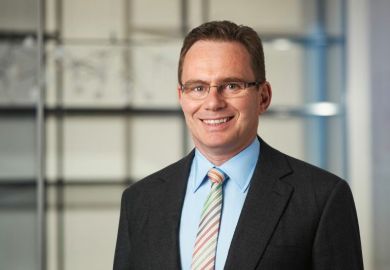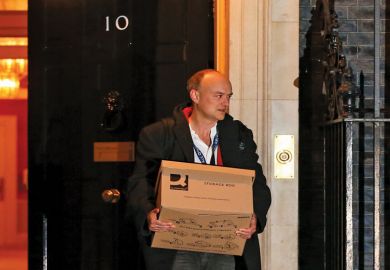The government’s chosen candidate to chair the UK’s main research funding body faced questions from MPs on his career in the “polluting extractive industries” and the potential for conflicts of interest with his role as Shell chair.
Sir Andrew Mackenzie – former chief executive of the world’s biggest mining company, BHP, former vice-president for petrochemicals at BP and now the government’s preferred candidate to be next UKRI chair – appeared before the House of Commons Science and Technology Committee for a pre-appointment hearing on 23 June.
The Scotland-born former researcher at the Aachen University of Applied Sciences, who holds a PhD in the organic chemistry of petrol from the University of Bristol, told MPs he was “encouraged” to apply for the post by a No 10 official he declined to name.
And he said that although the UKRI job was advertised as a one-day-a-week post, he planned to devote two days to it while working three days in his other role as chairman of Royal Dutch Shell.
Labour MP Rebecca Long-Bailey asked Sir Andrew how he would guard against any allegation of potential “bias towards the business interests in Shell” as UKRI chair, for example when it came to research on hydrogen fuels, where the company has major interests.
That was a “very fair and legitimate question” and would be “something that has to be managed very carefully and seriously”, Sir Andrew replied, although he doubted there would be many such instances where a potential conflict of interest would arise, stressing that he was chair of Shell and not the chief executive who runs the company.
Labour MP Zarah Sultana said companies that Sir Andrew had worked for were “among the 20 most polluting companies in the world” and asked how, given his career in the “extractive industries”, there could be “faith” in his ability to chair UKRI with its key role in funding research on green innovation needed to tackle climate change.
Sir Andrew replied that he had moved BHP towards a strategy of being “part of the move towards a zero-carbon future”, arguing that mining was needed to provide the metals required for the shift towards net zero, for example nickel in lithium batteries.
“I decided to become the chair of Shell because I’m very committed to getting to net zero,” he added, calling the company “a leader” in that field.
Ms Sultana also said Keri Facer, professor of educational and social futures at Bristol and former Zennström chair of climate change leadership at Uppsala University, had described Sir Andrew’s selection for UKRI chair as “like putting a tobacco industry magnate in charge of health research”.
“I understand it might appear that way,” Sir Andrew replied, before adding a “slight counter to that”.
“We all enjoy the benefits of low-cost energy…We want to continue to enjoy those benefits without the carbon. I happen to be chair of a company that has pledged to be part of that,” he said, highlighting its investments in fields such as hydrogen fuels and carbon capture and storage.
In terms of his vision for UKRI and research, Sir Andrew said he hoped to contribute to a “significant enhancement of our ability to transfer technology” and to making the organisation “less bureaucratic and more effective”.
Asked about the UK’s record in translating research into innovation and new companies, he said: “I don’t believe we’ve spent enough time worrying about how we build the bridges across the ‘Valley of Death’” between research and commercialisation.
And he said incentives in research, such as on publication and citations, did not provide “strong enough” incentive for researchers to work on “things that might have an application”.
On levelling-up and concentration of research funding in the London-Oxford-Cambridge “golden triangle”, Sir Andrew said: “Whatever the history, I would suggest UKRI could definitely be a helpful partner in realising the government’s levelling-up objectives.”
Where there was an opportunity to “build something new” and researchers could still be attracted if that was done in a “relatively deprived” place “outside the golden triangle, I think we should do so”, he added.
Register to continue
Why register?
- Registration is free and only takes a moment
- Once registered, you can read 3 articles a month
- Sign up for our newsletter
Subscribe
Or subscribe for unlimited access to:
- Unlimited access to news, views, insights & reviews
- Digital editions
- Digital access to THE’s university and college rankings analysis
Already registered or a current subscriber?








